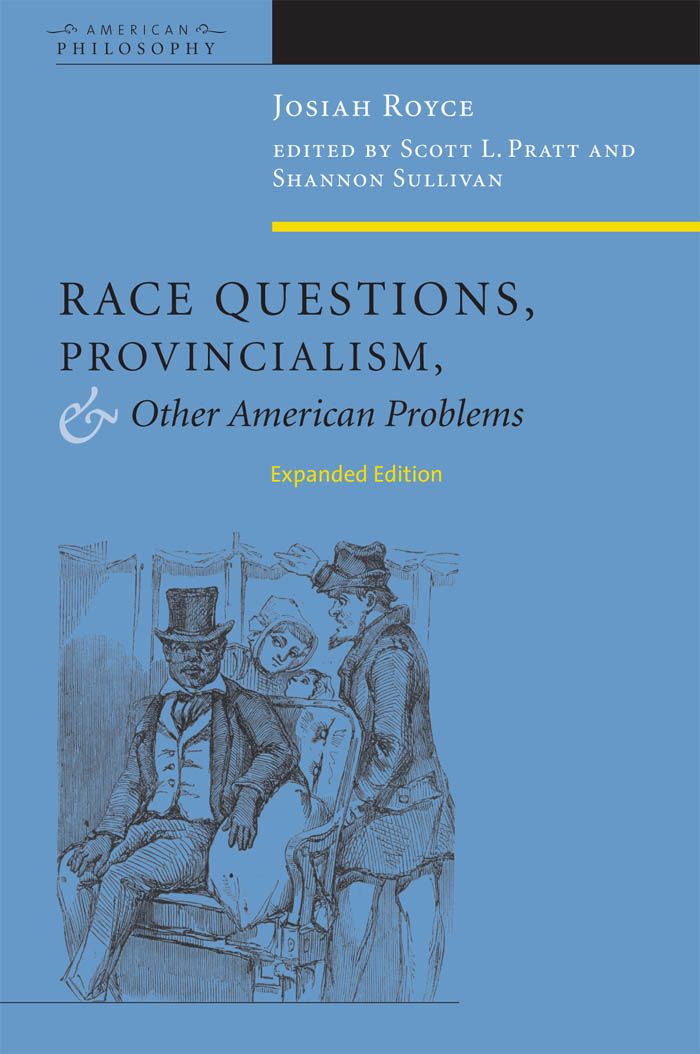Race Questions, Provincialism, and Other American Problems
Expanded Edition

This book can be opened with

In 1908, American philosopher Josiah Royce foresaw the future. Race questions and prejudices, he said, "promise to become, in the near future, still more important than they have ever been before." Like his student W. E. B. Du Bois in Souls of Black Folk (1903), Royce recognized that the problem of the next century would be, as Du Bois put it, "the problem of the color line." The twentieth century saw vast changes in race relations, but even after the election of the first African-American U.S. president, questions of race and the nature of community persist. Though left out of the mainstream of academic philosophy, Royce's conception of community nevertheless influenced generations of leaders who sought to end racial, religious, and national prejudice.
Royce's work provided the conceptual starting place for the Cultural Pluralism movement of the 1920s and 1930s, and his notion of the Beloved Community influenced the work and vision of Martin Luther King, Jr., and the civil rights movement.
Communities, whether they are understood as racial or geographic, religious or scientific, Royce argued, are formed by the commitments of individuals to causes or shared ideals. This starting point-the philosophy of loyalty-provides a means to understand the nature of communities, their conflicts, and their potential for growth and coexistence.
Just as this work had relevance in the twentieth century in the face of anti-Black and anti-immigrant prejudice, Royce's philosophy of loyalty and conception of community has new relevance in the twenty-first century. This new edition of Royce's Race Questions, Provincialism, and Other American Questions includes a new introduction to Royce's philosophy of loyalty and the essays included in the volume, and a second introduction connecting Royce's work with contemporary discussions of race.
The volume also includes six supplementary essays by Royce (unavailable since their initial publication before 1916) that provide background for the original essays, raise questions about his views, and show the potential of those views to inform other discussions about religious pluralism, the philosophy of science, the role of history, and the future of the American community.
A significant addition to the literature in Royce Studies and
American intellectual history. This collection makes available Royce's
contributions in areas ranging from philosophy of race, to virtue
ethics, even to philosophy of sports.
Royce the moral philosopher nowhere comes across more vividly and
humanly than in Race Questions, Provincialism, and Other American
Problems, and in the excellent assortment of related essays included
in the expanded edition. Defying critical stereotypes about the “block
universe” of abstract idealism, Royce grapples with stubborn
ambiguities, countercurrents and prejudices that complicate American
lives – probing uncomfortable issues that other American philosophers
of the period mostly ignored, and breathing life into the philosophy
of loyalty. For students of Royce’s moral and social philosophy, this
volume provides a tentative field manual for The Philosophy of
Loyalty, suggesting trajectories for further inquiry that remain
relevant even today. These essays – including the excellent
introductory material by Pratt and Sullivan–bear frequent
re-reading, as they fairly burst with insights into the embodied
Royce, his times, and our own futures.
A valuable resource for the increasing number of scholars working on various aspects of Royce's thought.
A valuable book for those with a strong interest in American thought.

